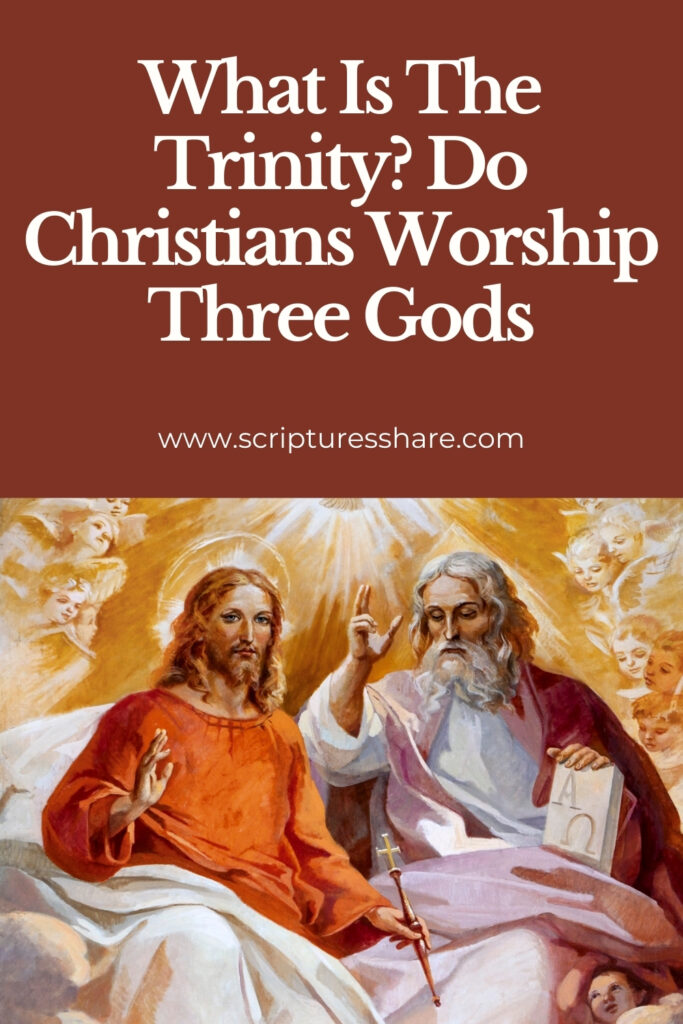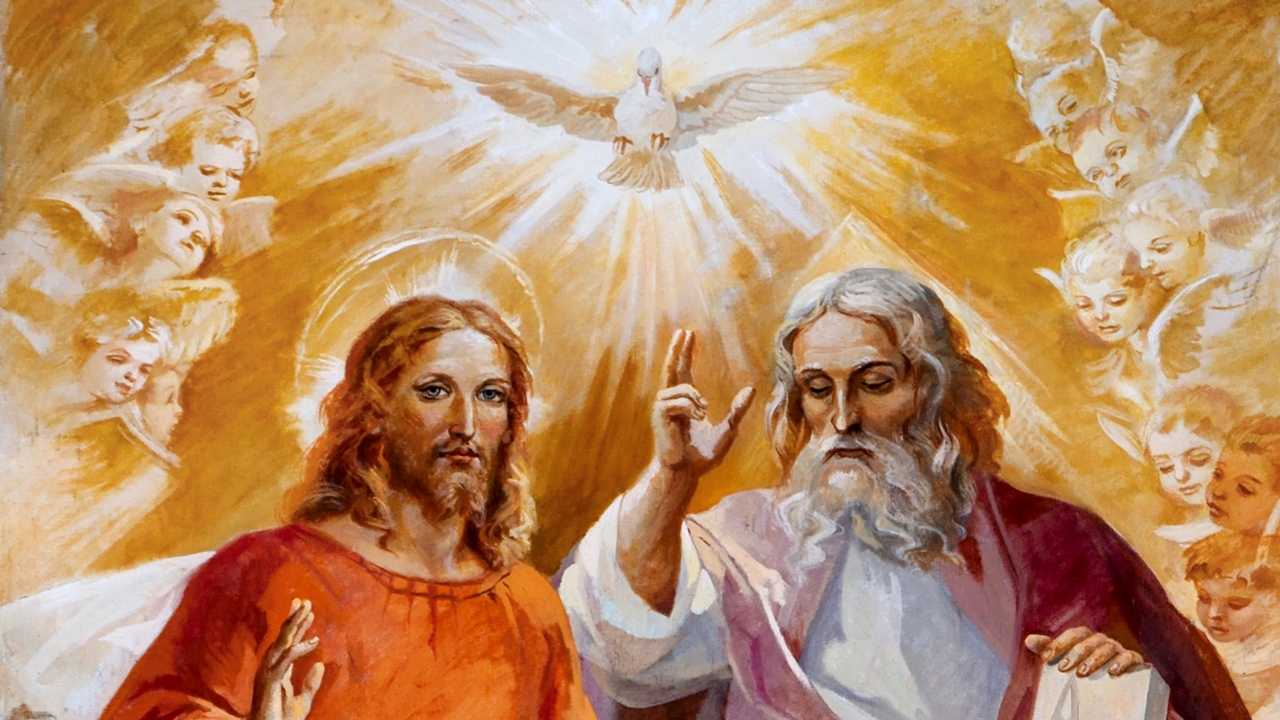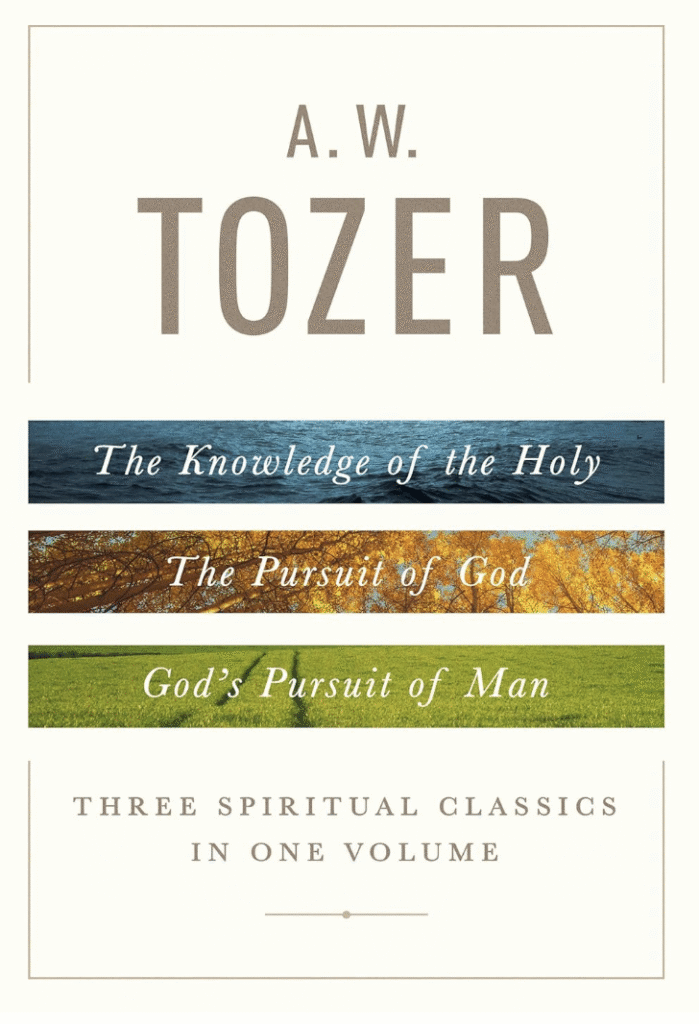No products in the cart.
What Is The Trinity? Do Christians Worship Three Gods
This post contains paid and/or affiliate links. I make a small commission at no extra cost to you. Please see our Privacy Policy.
The Trinity stands as Christianity’s most distinctive doctrine, setting it apart from all other monotheistic religions. This fundamental belief states that one God exists eternally as three distinct persons: the Father, the Son (Jesus Christ), and the Holy Spirit.
While this concept may seem complex, understanding the Trinity is essential for grasping the heart of Christian theology and worship.
What Is the Trinity? A Clear Definition
The Trinity doctrine teaches that God is one divine essence existing in three co-equal, co-eternal persons. Each person—Father, Son, and Holy Spirit—is fully God, yet they remain one unified God, not three separate deities.
This mystery of “three in one” represents the deepest revelation of God’s nature in Christian belief.
Key Trinity Principles:
- Unity of Essence: All three persons share the same divine nature
- Distinction of Persons: Each has unique roles and relationships
- Co-equality: No person is superior or inferior to another
- Co-eternity: All three have existed from eternity past
Historical Development of Trinity Doctrine
The Trinity doctrine didn’t emerge overnight but developed through centuries of biblical study and theological reflection.
Early Church Struggles
The early Christian community faced the challenge of reconciling biblical passages that spoke of one God with texts revealing three distinct divine persons. This tension led to various interpretations and, unfortunately, several heresies.
The Council of Nicaea (325 AD)
This pivotal council addressed the Arian heresy, which claimed Jesus was subordinate to the Father. The council affirmed that Jesus is “of the same substance” (homoousios) as the Father, establishing the foundation for Trinity doctrine.
The Council of Constantinople (381 AD)
This council completed the Trinity formulation by affirming the Holy Spirit’s full divinity, resulting in what we now know as the Nicene Creed.
The Three Persons of the Trinity Explained
God the Father
The Father serves as the eternal source within the Trinity. He is:
- The Creator and sustainer of the universe
- The one who sent the Son for humanity’s redemption
- The ultimate authority in the divine relationship
God the Son (Jesus Christ)
Jesus Christ, the second person of the Trinity, is:
- Fully God and fully human (the doctrine of the Incarnation)
- The Word made flesh who dwelt among humanity
- The Redeemer who offers salvation through his life, death, and resurrection
God the Holy Spirit
The Holy Spirit, the third person of the Trinity:
- Convicts people of sin and leads them to faith
- Empowers and guides believers in their spiritual journey
- Provides spiritual gifts and comfort to the Christian community

Do Christians Worship Three Gods? Clearing Up Common Misconceptions
The Answer: Absolutely Not. Christianity remains strictly monotheistic. Christians worship one God who has revealed himself in three persons.
Common Misconceptions:
- “Christians are polytheists” – False. Christians believe in one God
- “The Trinity means three gods” – False. It means one God in three persons
- “Each person is one-third God” – False. Each person is fully God
Helpful Analogies (With Limitations):
While no analogy perfectly captures the Trinity’s mystery, some help illustrate the concept:
- Water: Exists as ice, liquid, and steam—same substance, different forms
- Egg: Shell, white, and yolk—three parts, one egg
- Sun: The sun itself, its light, and its heat—distinct yet inseparable
Remember, these analogies have limitations and cannot fully explain the divine mystery.
Biblical Foundation for the Trinity
Though the word “Trinity” doesn’t appear in Scripture, the concept emerges clearly from biblical texts:
Old Testament Hints:
- Genesis 1:26: “Let us make mankind in our image”
- Isaiah 6:8: “Whom shall I send? And who will go for us?”
- The appearances of the Angel of the Lord
New Testament Revelations:
- Jesus’ Baptism (Matthew 3:16-17): All three persons present simultaneously
- Great Commission (Matthew 28:19): Baptizing “in the name of the Father, Son, and Holy Spirit”
- Apostolic Benediction (2 Corinthians 13:14): Grace of Christ, love of God, fellowship of the Spirit
The Trinity’s Role in Christian Worship and Daily Life
In Worship:
- Prayers often address all three persons
- Hymns and liturgies celebrate the triune God
- The Doxology: “Praise God from whom all blessings flow”
- Baptismal and communion services invoke the Trinity
In Daily Christian Living:
- Relationship with the Father: As loving Creator and sustainer
- Following Jesus: As Savior, Lord, and example
- Walking in the Spirit: For guidance, comfort, and empowerment
Why the Trinity Matters for Christians Today
Understanding the Trinity impacts every aspect of Christian faith:
1. Salvation
The Trinity’s cooperative work in salvation shows God’s comprehensive love—the Father’s plan, the Son’s sacrifice, and the Spirit’s application.
2. Prayer Life
Christians can pray to the Father, through the Son, in the power of the Holy Spirit, creating rich, multifaceted communication with God.
3. Community
The perfect unity and diversity within the Trinity models healthy Christian relationships and church life.
4. Assurance
Knowing God as Trinity provides comfort—the Father’s care, Christ’s advocacy, and the Spirit’s presence offer complete security.
Frequently Asked Questions About the Trinity
Q: How can three equal one? A: This mystery transcends human mathematics. We’re dealing with divine reality, not numerical calculation.
Q: Does the Trinity make Christianity illogical? A: The Trinity is above human reason but not contrary to it. Many profound truths exceed our complete understanding.
Q: Why is Trinity doctrine important? A: It reveals God’s nature, explains salvation’s fullness, and guards against heretical teachings about God’s identity.
Q: How do I explain the Trinity to children? A: Use simple analogies, emphasize God’s love shown in three ways, and focus on each person’s role in their lives.
Conclusion: Embracing the Mystery
The Trinity remains Christianity’s central mystery—one God eternally existing as three distinct persons. While our finite minds cannot fully comprehend this infinite reality, we can embrace it with wonder and worship.
This doctrine isn’t merely a theological theory but living truth that transforms how Christians relate to God. Through the Trinity, believers experience the Father’s love, the Son’s redemption, and the Spirit’s presence in daily life.
As you continue your spiritual journey, let the Trinity’s mystery deepen your reverence for God while enriching your understanding of his multifaceted relationship with humanity.
In worship, prayer, and service, may you experience the fullness of the triune God who reveals himself as perfect love, grace, and fellowship.
Understanding the Trinity enriches every Christian’s faith journey. Whether you’re new to Christianity or seeking deeper theological understanding, this foundational doctrine opens windows into God’s infinite nature and boundless love for humanity.
















